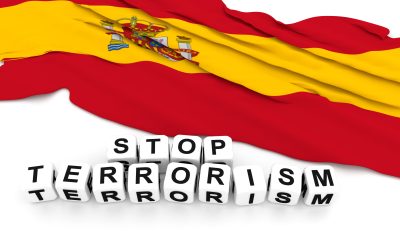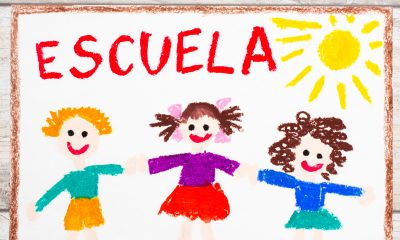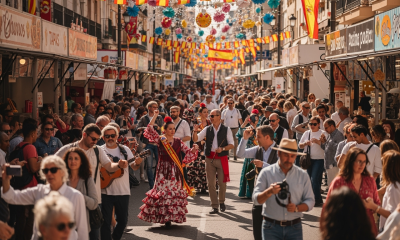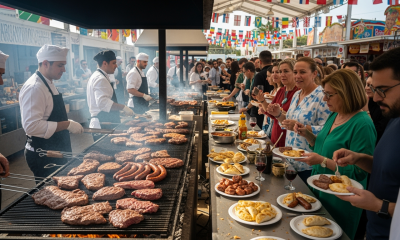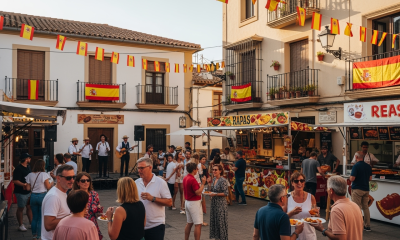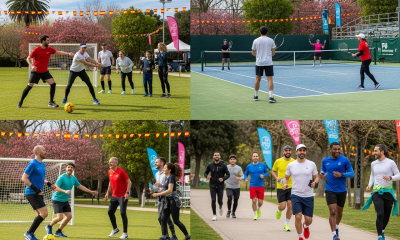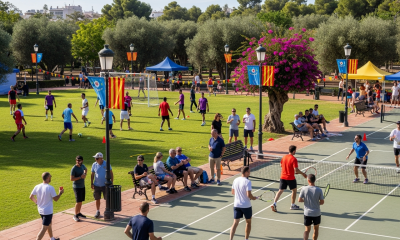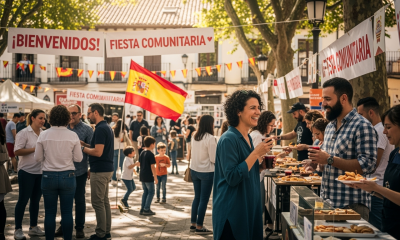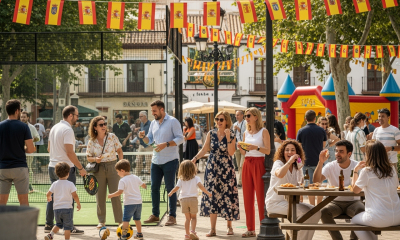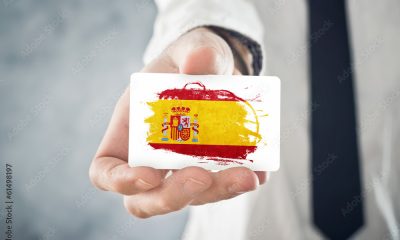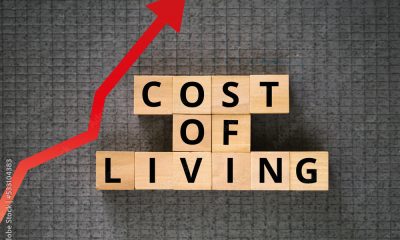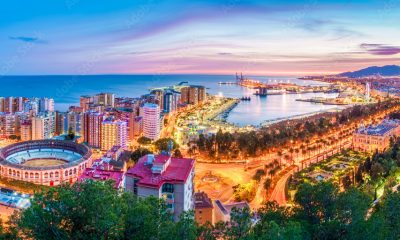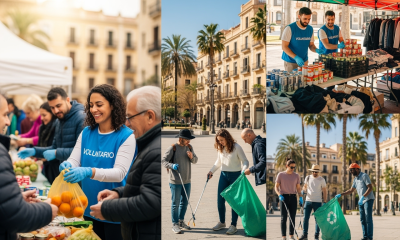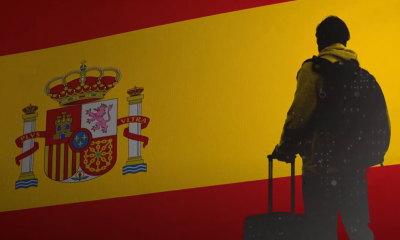Sport
“Spain triumphs: Champions of EM 2024!”

When Spain won the UEFA European Championship 2024, the entire country erupted into an unparalleled celebration.
Spain, once again crowned as champions, revived memories of past glories, uniting the nation in pride and joy.
The victory sparked celebrations in every corner of the country, with fans flooding the streets in the iconic red and yellow of La Roja, celebrating their team’s historic achievement.
Nationwide Celebrations
In Madrid, fans immediately swarmed to Plaza de Cibeles, the traditional site of celebrations.
The streets filled with thousands of jubilant supporters, singing and dancing, as fireworks lit up the sky.
Major cities like Barcelona, Seville, and Valencia saw similar scenes, with landmarks like Plaza de Catalunya and Plaza de España becoming hubs of festivity.
In Barcelona, the famed Las Ramblas was a sea of waving flags and joyful chants as fans reveled in the triumph.
Victory Parade and Team Celebration
The Spanish national team, La Roja, received a hero’s welcome upon their return to Madrid.
An open-top bus carried the team through the streets, where fans showered them with confetti and cheers.
The journey ended at Plaza Mayor, where the players and coaches addressed the crowd, holding the championship trophy aloft to roars of approval.
Later, the team was formally received by Spain’s Prime Minister at La Moncloa and by the royal family at the Royal Palace, further cementing their place in Spanish history.
This victory, following Spain’s rich footballing legacy, was another monumental chapter in the nation’s sporting achievements.
Street Parties and Local Festivities
Across Spain, spontaneous street parties broke out in every town and village.
From the small streets of Andalusia to the Basque Country, Spanish flags adorned balconies, and celebratory fireworks illuminated the night sky.
Families and friends gathered for traditional Spanish feasts, toasting to the victory with paella, tapas, and local wines.
In Catalonia, the Castellers—human tower builders—performed in honor of the triumph, symbolizing the strength and unity of Spain.
Many towns held local parades, with music, dancing, and fireworks, turning the whole nation into a celebration ground.
Social Media and Global Reactions
Globally, Spanish fans and football enthusiasts took to social media to share their excitement.
Hashtags like #EspañaCampeón and #LaRoja2024 trended, and clips of key moments from the tournament flooded platforms like Twitter and Instagram.
The victory wasn’t just a national celebration, but a global one, as Spain’s rich footballing legacy was once again the talk of the sports world.
Conclusion
Spain’s victory in the EM 2024 has cemented their position as one of the powerhouses of European football.
The celebrations were nothing short of spectacular, filled with national pride, joy, and unity.
With street parties, victory parades, and global recognition, Spain’s triumph will be remembered as one of the great moments in the country’s sporting history.
Cultural
Get active with sports teams: a guide for expats in Spain

Published: August 2025
Getting involved in sports is one of the fastest and most enjoyable ways to integrate into Spanish life. Whether you’re a passionate football fan, a tennis enthusiast, or just want to stay fit and meet friends, Spain’s sports scene is vibrant, welcoming, and open to all. Joining a local team or club not only improves your health but also helps you build a social network and learn the language in a natural setting. Here’s how expats can get active with sports teams in Spain.
Why sports are so important in Spain
Spain is famous for its love of sports. From world-class football and basketball to padel, cycling, and running, there’s something for everyone. Sports bring people together, break down language barriers, and offer a fun way to experience Spanish culture. Many expats find their first local friends through shared training sessions, matches, or tournaments.
Popular sports and how to join
- Football (soccer): Nearly every town has local teams for all ages and levels. Check your municipal sports center.
- Padel and tennis: Spain is a global leader in padel. Most cities have public and private courts, with clubs offering lessons and social tournaments.
- Basketball: Many towns have amateur teams and leagues. Great for all ages and skill levels.
- Running and cycling: Join local clubs for group runs, bike rides, and races. Try Meetup.com for running groups.
- Swimming, yoga, fitness: Most municipal sports centers offer classes, open gyms, and pools.
How to join a team or club
- Check your local town hall’s website or visit the nearest sports center for a list of teams and clubs.
- Ask about open training sessions—many clubs let you try before committing.
- Bring your ID (passport/NIE) and be ready to fill out a short registration form.
- Most clubs charge a small monthly or annual fee. Equipment can usually be rented or borrowed at first.
- Don’t worry if your Spanish isn’t perfect—sports are a universal language!
Benefits of joining sports teams as an expat
- Meet locals and other expats in a relaxed, social environment
- Stay healthy and active all year round
- Improve your Spanish through real-life conversations
- Participate in tournaments, social events, and trips
- Get insider tips on local life and culture
Useful links
Do I need to speak Spanish to join a sports team? No, many clubs are used to welcoming expats and will help you learn as you go. How much does it cost to join a sports club? Fees are usually affordable (€10–€40/month), and many clubs offer free trial sessions. Can I join as a complete beginner? Absolutely! Most clubs have teams for all levels, and coaches are happy to help newcomers. Are there sports clubs for children and families? Yes, most towns offer youth leagues and family-friendly activities. What equipment do I need? Basic gear is often provided or can be borrowed until you decide to buy your own. How do I find out about local matches and events? Check club websites, local notice boards, or ask your teammates for info. Can I join more than one club? Yes, many expats join several clubs to try different sports and meet more people. Are there women-only or mixed teams? Both options are widely available—ask at your local sports center for details. How do I stay motivated to keep active? Set goals, join group challenges, and make it social—having friends on your team helps! Is it easy to make friends through sports? Yes, shared activities and teamwork make it one of the best ways to build a social network in Spain.
Disclaimer: This article is for informational purposes only. Always check with clubs or sports centers for the latest schedules and requirements.
Cultural
Join local clubs and associations: the key to integrating in Spain

Published: August 2025
One of the best ways to feel at home in Spain is to join local clubs and associations. Whether you’re passionate about sports, arts, volunteering, or simply want to meet new people, Spain offers an incredible variety of groups where expats and locals mix. Getting involved in clubs not only helps you build a social network, but also fast-tracks your language skills, cultural understanding, and sense of belonging. Here’s how you can make the most of Spain’s vibrant club scene.
Why clubs and associations matter for expats
Clubs are the heart of Spanish community life. From football and cycling to chess, hiking, art, and gastronomy, there’s a club for almost every interest. Joining a club is an easy way to meet people who share your passions, get insider tips on local life, and take part in events you might otherwise miss. Many expats find their first Spanish friends through these groups.
How to find the right club for you
- Check your local town hall (Ayuntamiento de Málaga) for a list of registered clubs and associations.
- Use Meetup.com to find international and local groups in your area.
- Look for flyers in community centers, libraries, and cafés—many small clubs still advertise offline.
- Ask neighbors, colleagues, or other expats for recommendations.
Popular types of clubs in Spain
- Sports clubs: Football, tennis, padel, running, cycling, basketball, yoga, and more.
- Hobby and interest groups: Photography, painting, chess, language exchange, cooking, book clubs.
- Volunteering associations: Animal rescue, environmental projects, social aid, Red Cross (Cruz Roja).
- Professional and networking groups: Young entrepreneurs, women in business, tech meetups.
- International clubs: Many cities have “International Friends” or “Expats in [City]” groups.
How to join and get involved
- Contact the club via their website, social media, or by attending an open event.
- Most clubs are happy to welcome newcomers—don’t worry if your Spanish isn’t perfect!
- Attend a few meetings or activities to see if the group is a good fit for you.
- Offer to help out or volunteer for events; you’ll make friends faster and feel more included.
Benefits of joining clubs and associations
- Meet locals and other expats with shared interests
- Practice Spanish in a relaxed, real-life setting
- Access to exclusive events, workshops, and trips
- Get insider tips on living in Spain
- Feel part of the community and reduce homesickness
Useful links
- Meetup.com – find groups in Spain
- Cruz Roja Española (Red Cross Spain)
- Ayuntamiento de Málaga – local clubs
- Expats in Spain Facebook group
Do I need to speak Spanish to join a club? No, many clubs welcome English speakers and are used to helping newcomers. Joining is a great way to improve your Spanish. How much does it cost to join a club? Most clubs charge a small annual fee (€20–€100), but many events are free or pay-as-you-go. Can I join more than one club? Absolutely! Many expats join several clubs to explore different interests and meet more people. Are there clubs for families and children? Yes, there are sports teams, music groups, and cultural associations for all ages. How do I find out about club events? Follow your club on social media, check their website, or sign up for newsletters. Is volunteering a good way to meet people? Yes, volunteering is a fantastic way to make friends and contribute to your community. What if I’m nervous about joining alone? Most newcomers feel the same way—clubs are used to welcoming people who come alone. Can I create my own club if I don’t find what I’m looking for? Yes, it’s easy to start a new group—use Meetup.com or Facebook to invite others. Are there online-only clubs? Yes, many hobby and language groups meet online or combine online and in-person events. How do I stay updated about new clubs in my area? Check your town hall’s website, local notice boards, and expat forums regularly.
Disclaimer: This article is for informational purposes only. Always check club websites or contact organizers for the most up-to-date information.
Cultural
Why social life matters for expats in Spain

Published: August 2025
Moving to Spain is about more than just finding a home or a job – it’s about building a life. For expats, developing a social network is one of the most important (and rewarding) parts of settling in. A strong social life helps you integrate, improves your well-being, and opens doors to opportunities you might never have found otherwise. In this article, we explore why social life matters so much for expats in Spain, and how you can make the most of it.
The importance of connection
Research shows that expats with an active social life adapt faster and feel happier in their new country. In Spain, where community is woven into daily life, having friends and connections is essential for everything from navigating bureaucracy to enjoying local traditions. Social ties help you:
- Learn the language faster through real conversations
- Find support with paperwork, housing, and job hunting
- Discover hidden gems and local experiences
- Feel less isolated and more at home
Integration and mental health
Loneliness is a common challenge for new arrivals. Studies from InterNations and Expatica show that expats who actively build social circles experience lower stress and adapt more easily. In Spain, joining community events, sports clubs, or language exchanges can be a lifeline for mental health and well-being.
Building your network: where to start
Spain offers endless opportunities to meet people. Some of the best ways to start building your social network include:
- Joining local clubs and sports teams (check your town hall or Meetup.com)
- Attending language exchanges or international meetups
- Volunteering for local charities or community projects
- Participating in festivals and neighborhood events (Spain’s official event calendar)
- Connecting with expat groups on Facebook or WhatsApp
How social life helps you succeed as an expat
A strong social network isn’t just about friendship – it’s a practical tool. Friends can recommend trusted professionals, help with job leads, and guide you through Spanish customs. Many expats find their first job, apartment, or even business partner through social connections rather than formal channels.
Overcoming barriers
It’s normal to feel shy or out of place at first. Remember, most Spaniards appreciate when foreigners make an effort. Don’t be afraid to join in, ask questions, or invite someone for coffee. The more you participate, the easier it becomes.
Useful resources
- Meetup.com – find events in Spain
- InterNations Spain
- Spain’s official event calendar
- Expats in Spain Facebook group
- New in Spain – community guides
How can I meet people in Spain if I don’t speak Spanish? Start with international meetups, language exchanges, and expat groups – many events are bilingual or in English. Is it hard to make friends as an adult expat in Spain? It takes effort, but joining clubs, volunteering, and saying yes to invitations makes it much easier. Are there clubs for specific hobbies or sports? Yes, Spain has clubs for everything from hiking to photography and chess. Check local listings or Meetup.com. How do I find out about local events? Town hall websites, Facebook groups, and Spain’s official event calendar are great sources. Can a social network help with practical issues like paperwork? Absolutely – friends and local contacts are often the best source of advice and support for bureaucracy. Is it normal to feel lonely at first? Yes, many expats feel isolated initially. Getting involved in groups and events helps a lot. What if I’m introverted? Try smaller group activities or volunteering, where it’s easier to connect one-on-one. Are there online communities for expats in Spain? Yes, Facebook, WhatsApp, and forums like Expatica have active expat communities. How important is food in Spanish social life? Very important – sharing meals is a key way to build friendships and be included. What’s the biggest benefit of having a social life in Spain? Feeling at home, getting support, and making the most of your experience in Spain.
Disclaimer: This article is for informational purposes only and based on expat experiences. Your journey may vary, but building a social life in Spain is always worth the effort.













